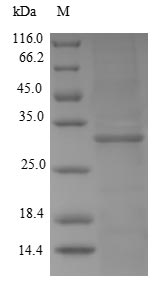Amino acids 25-261 form the expressed segment for recombinant Human KLK2. The theoretical molecular weight of the KLK2 protein is 30.2 kDa. This KLK2 recombinant protein is manufactured in e.coli. The KLK2 gene fragment has been modified by fusing the N-terminal 6xHis tag, providing convenience in detecting and purifying the recombinant KLK2 protein during the following stages.
Human kallikrein-2 (KLK2) is a serine protease belonging to the kallikrein-related peptidase family. It is primarily expressed in the prostate gland and is involved in several physiological processes. KLK2 is best known for its role in the cleavage of semenogelins, proteins found in seminal fluid, contributing to the liquefaction of semen after ejaculation. KLK2 is also used as a biomarker for prostate cancer detection and monitoring, as its levels in blood are elevated in individuals with prostate cancer. Understanding the functions and regulation of KLK2 is crucial for advancing prostate cancer therapeutics, making it a significant target for research in the field of urology and oncology.




